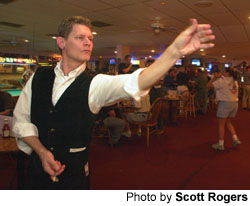
November 7, 2000 — From the moment I walked into Sweetwater Billiards in Duluth, Jonathan Forrester was all business.
He was sizing me up. He was trying to figure out what, if anything, I knew about darts.
I knew a little. Back in college, I threw my share. Not many other sports you can play in a bar.
So, he quizzed me, and I believe I passed. After the interrogation, almost as a reward, he presented me with three darts — shiny to the eye and cold to the touch — and asked me to throw them. Now, he wanted to test my “style.” 
Aim at the 20, he instructed. I hit two out of three.
“You’ve got some talent,” Forrester said, nodding. “Good darts.”
The 45-year-old Forrester, a computer programmer from Cumming, knows good darts. Well, perhaps good isn’t the right qualifier. You don’t win the Tennessee state championship — which Forrester did twice in the early 1990s — by just being good.
Forrester will say that his championship days are behind him, that he simply doesn’t throw enough anymore. But you’d think differently if you saw him play.
Forrester will say that he rarely uses his dart board at home because a computer sits in its way. But he can still throw bull’s-eyes at will, he can still hold his own in the Metro Atlanta Darts Association Monday-night league at Sweetwater Billiards.
And he can definitely show a rookie who used to play darts for beer a thing or two.
Forrester began throwing darts 21 years ago in Pearl Harbor. A first-class petty officer in the U.S. Navy, he wandered into an enlisted club one day and watched as a man threw bull’s-eye after bull’s-eye after bull’s-eye.
Forrester decided he’d like to be able to do that, too. So, for the next six months, he spent his lunches losing to that man. And then Forrester won a game. And then another. And another. He had gotten quite good.
He joined a league in Hawaii. He started a darts team on his submarine.
“We were out at sea a lot of the time,” Forrester said. “But we brought a dart board with us. We hung it on the back of the torpedo-room door.”
No torpedoes at Sweetwater Billiards, but plenty of dart boards to be sure. And reveille is replaced with Pearl Jam.
We played cricket, a game popular in tournaments and taverns alike. I had played before, and won my share of Yuengling Lagers in the process. But never did I realize how much strategy the game involved.
For every possible situation, there is a prescribed response. When in doubt, consult Forrester’s “Laws of Cricket.” I was lucky, he usually carries printouts of the list with him.
Forrester’s left-handed toss is faultless and fluid, the same every time. To keep it that way, he grows the nail on his left pinky finger longer than the rest, and uses it as a guide.
“I’m the only one that does that, but I’m weird,” Forrester chuckled sheepishly. “The more variables you can take out of your throw, the better your shot is going to be.”
We began with a couple of instructional games. In the first, Forrester had me practice strategies used when ahead in a game of cricket. In the second, which was far easier for me to simulate, I played from behind.
Forrester would make every shot he needed to prove a point or create a scenario. And when the situation called for an errant toss, it was obvious he did it on purpose. His darts would end up in a tight group somewhere far away from where they would have done his score any good. This guy even misses precisely.
But when Forrester is trying, misses are anomalous.
“Since you’ve got two 17s, I’m going to throw my first dart at triple 17,” Forrester explained during one of our practice games. “If I hit it, not only do I close down the number, but it’s demoralizing.”
Well, his first dart split that triple 17 — a shot that some would say is more difficult than a bull’s-eye — and I just shook my head.
“So, I’m demoralized now, right?” I said.
No, that would come later. That would come in our “real” game.
Forrester could have ended this game in around 10 shots if he wanted to, I later learned. But, with the aid of some of his guided misfires, he let me hang around. I played OK, too. Made some decent shots here and there.
 “Good darts, Dan,” Forrester would say to me. “I’m impressed.”
“Good darts, Dan,” Forrester would say to me. “I’m impressed.”
He even gave me plenty of opportunities to put the game away. In fact, all I needed was one single bull’s-eye to do it.
I wanted this win — no matter how cheap or Pyrrhic. I wanted to hit that bull’s-eye.
But I couldn’t. Instead, for some reason, I repeatedly hit No. 11. Dart after dart. Good grouping, I was told.
“That’s the object of the game,” Forrester said. “You want your darts to be grouped around one spot. But it helps if they’re grouped around the right one.”
He smiled, and proceeded to miss more bull’s-eyes — on purpose, of course. Dart after dart. He was toying with me. He wanted me to win, too.
But enough was enough. After again failing to hit that last baffling bull’s-eye, I asked Forrester how many more chances he was going to let me have.
“That was it,” he replied, and then promptly proceeded to place each one of his darts inside the bull’s-eye. One. Two. Three.
Good darts, Jonathan. Good darts, indeed.
Rules of cricket
• In play: Nos. 15-20 and the bull’s-eye
• Object: Winner is the first to hit each number and the bull’s-eye three times, and to score the most points.
• Scoring: Players alternate throwing three darts apiece. Players can hit a number three times, after that they can continue to hit that number for points until their opponent hits it three times — after which the number is “closed,” or removed from play. Doubles count as two, triples as three.
Forrester’s laws of cricket
1. Always look closely at scoreboard before throwing.
2. Always take points lead first, before closing other numbers.
3. Always assume your opponent will throw at least a five-counter.
4. If you can’t close a number by hitting singles, throw for points.
5. Always remember that singles will win a game when you can’t hit triples.
6. Never play “catch-up” unless you have the points lead or no points have been scored.
7. If you are behind in points, start your turn on a “virgin” number.
8. Never throw at a double unless it will win the game.
9. Never take a win or loss for granted, no matter the opponent.
10. Never give up on a game, no matter how bad it looks.
